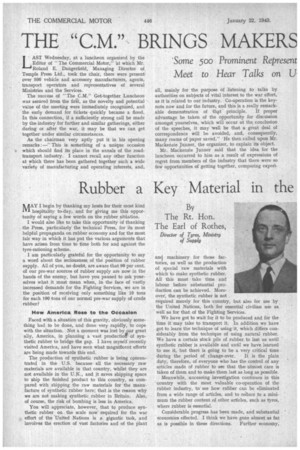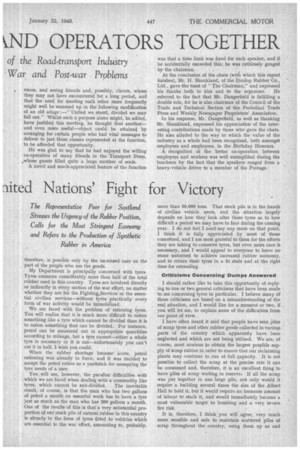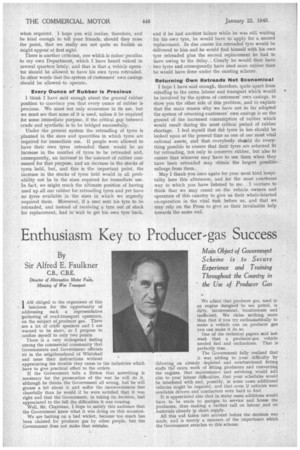Rubber a Key Material in the nited Nations' Fight for Victory
Page 30

Page 31

Page 32

If you've noticed an error in this article please click here to report it so we can fix it.
By The Rt. Hon. The Earl of Rothes,
Director of Tyres, Ministry of Supply
The Representative Peer for Scotland Stresses the Urgency of the Rubber Position, Calls for the Most Stringent Economy and Refers to the Production of Synthetic Rubber in America
AilAY I begin by thanking my hosts for their most kind IVI hosPitality to-day, and for giving me this opportunity of saying a few words on the rubber sitnation.
I would also like to take this opportunity of thanking the Press, particularly the technical Press, for its most helpful propaganda on rubber economy and for the most fair way in which it has put the various arguments that have arisen from time to time both for and against the tyre-rationing scheme.
I am particularly grateful for the opportunity to say a word about the seriousness of the position of rubber supply. All of you, no doubt, are aware that 90 per cent. of our pre-war sources of rubber supply are now in the hands of the enemy, but have you paused to ask yourselves what it must mean when, in the face of vastly increased demands for the Fighting Services, we are in the position of receiving only something like 10 tons for each 100 tons of our normal pre-war supply of crude rubber?
How America Rose to the Occasion Faced with a situation of this gravity, obviously something had to be done, and done very rapidly, to cope with the situation. Not a moment was lost by our great ally, America, in planning a vast productiot of synthetic rubber to bridge the gap. I have myself recently visited America, and have seen what magnificent efforts are being made towards this end.
The production of synthetic rubber is being cpncentra,teci in the U.S. because • all the necessary raw materials are available in that country, whilst they are not available in the U.K., and it saves shipping space to ship the finished product to this country, as compared with shipping the raw materials for the manufacture of synthetic rubber here; that is the reason why we are not making synthetic rubber in Britain. Also, of course, the risk of bombing is less in America.
You will appreciate, however, that to produce synthetic rubber on _ the scale now required for the war effort of the 'United Nations is a gigantic task, and involves the erection of vast factories and of the Plant
ancl machinery for those factories, as well as the production of special raw ' materials with which to make synthetic rubber. All this must take time and labour before substantial production can be achieved. Moreover, the synthetic rubber is not required merely for this country, but also for use by the United Nations, both for essential civilian lige as well as for that of the Fighting Services.
We have got to wait for it to be produced and for the time it may take to transport it. In addition we have got to learn the technique of using it, which differs con siderably from the technique of using natural rubber.
We have a certain stock pile of rubber, to last us until synthetic rubber is available and until we have learned to use it, but there is going to be a very critical time during the period of, change-over. It is the plain duty, therefore, of everyone who has the control of any articles made of rubber to see that the. utmost care is taken of them and to make them last as long as possible.
Meanwhile, unceasing investigation continues in this country with the most valuable co-operation of the rubber industry, to see how rubber can be eliminated from a wide range of articles, and to reduce to a minimum the rubber content of other articles, such as tyres, where rubber is essential.
Considerable progress has been made, and substantial • economies effected. I think we have gone almost ai far as is possible in these directions. Further economy, therefore, is possible only by the increased care on the part of the people who use the goods.
My Department is principally concerned with tyres Tyres consume considerably more than half of the total rubber used in this country. Tyres are involved directly or indirectly in every section of the war effort, no matter whether they are for the Fighting,Services or the essential civilian services—without tyres practically every form of war activity would be immobilized.
We are faced with the problem of rationing tyres. You will realize that it is much more difficult to ration something like a tyre which cannot be divided than it is to ration something that can be divided. For instance, petrol can be measured out in appropriate quantities according to mileage, but a tyre cannot—either a whole tyre is necessary or it is not—unfortunately you can't cut it in half, I-wish You could.
When the rubber shortage became acute, petrol rationing was already in force, and it was decided to accept the petrol ration as a yardstick for measuring the tyre needs of a user.
You ,will see, however, the peculiar difficulties with which we are faced when dealing with a commodity like tyres, which cannot be sub-divided. The inevitable result, of course, is that the man who has two gallons of petrol a month on essential work has to have a tyre just as much as the man who has 200 gallons a month. One of the results of this is that a very substantial proportion of our stock pile of natural rubber in this country is already in the form of tyres fitted to vehicles which are essential to the war effort, amounting to, probably, more than 50,000 tons. That stock pile is in the hands of civilian vehicle users, and the situation largely' depends on how they look after these tyres as to how difficult a period we may have to face during the corning year. I do not feel I need-say any more on that point. I think it is fully appreciated by most of those concerned, and I am most grateful to them for the efforts they are taking to conserve tyres, but even more care is necessary, and I would appeal to everyone to leave no stone unturned to achieve increased rubber economy, and to return their tyres in a fit state and at the right time for retreading.
Criticisms Concerning Dumps Answered
I should rather like to take this opportunity of replying to one or two general criticisms that have bee,n made to me concerning tyres in particular. I believe many of these criticisms are based on a misunderstanding of the , real situation, and I would like for a moment or two, if you will let me, to explain some of the difficulties from our point of view.
I have often heard it said that people have seen :piles of scrap tyres and other rubber goods collected in various parts of the country which apparently have been neglected and which are not being utilized. We are, of course, most anxious to obtain the largest possible supply of scrap rubber in order to ensure that our reclaiming plants may continue to run at full capacity. It is not possible to collect the scrap at the precise rate it can be consumed and, therefore, it is an excellent thing to have piles of scrap waiting in reserve, If all the scrap was put together in one ,large pile, not only would it require a building several times the size of the Albert Hall to hold it, but it would require an immense amount of labour to stack it, and would immediately become a most vulnerable target to bombing and a very severe fire risk.
It is, therefore, I think. you will agree, very much more sensible and safe to maintain scattered piles of scrap throughout the country, using them up as and
when required. _I hope you will realize, therefore, and be kind enough to tell your friends, should they raise the point, that we really are not quite so foolish as might appear at first sight.
There is another criticism, one which is rather peculiar to my own Department, which I have heard voiced in several quarters lately, and that is that a Vehicle operator should be allowed to have his own tyres retreaded. In other words that the system of Customers' own casings should be allowed .to operate.
Every Ounce of Rubber is precious I think I have said enough about the general rubber position to convince you that every ounce of rubber is precious. We must not only economize in its use, but we must see that none of it is used, unless it be required for some immediate purpose, if the critical gap between crude and synthetic is to be bridged successfully.
Under the present system the retreading of tyres is planned in the sizes and quantities in which tyres are required for immediate use. If people were allowed to have their own tyres retreaded there would be an increase in the number of tyres to be retreaded and, consequently, an increase in the amount of rubber consumed for that purpose, and an increase in the stocks of tyres held, but, and this is the important point, the increase in the stocks of tyres held would in all probability not be in the sizes required for immediate use. In fact, we might reach the ultimate position of having used up all our rubber for retreading tyres and yet have no lyres available in the sizes in which we urgently required them. Moreover, if a user sent his tyre to be retreaded, and instead of receiving a. tyre out of stock for replacement, had to'wait to get his own tyre back, and if he had another failure while he was still waiting for his own tyre, he would have to apply for a second replacement. In due course his retreaded tyre would be delivered to him and he would And himself with his own tyre retreaded plus the second replacement he had to have owing to the delay. , Clearly he would then have two tyres and consequently have Used more rubber than he would have done under the existing scheme.
Returning Own Retreads Not Economical
I hope I have said enough, therefore, quite apart from referring to the extra labour and transport which would be involved by the system of customers' own casings, to show you the other side of this problem, and to explain that the main reason why we have not so far adopted the system of returning customers' own casings is on the ground of the increased consumption of rubber which would result during the most critical period of rubber shortage. I feel myself that the tyres in use should be looked upon at the present time as one of our most vital national assets, and that everybody sheinld do everything possible to ensure that their tyres are returned fit for retreading, not only to conserve rubber, but also to ensure that whoever may have to use them when they have been retreaded may obtain the largest possible. mileage from them. _
May I thank you once again for your most kind hospitality here this afternoon, and for the most courteous way in which you have listened to me. I venture to think that we may count on the vehicle owners and operators of this country to give us their whole-hearted co-operation in the vital task before us, and that we may rely on the Press to give its their invaluable help towards the same end.




























































